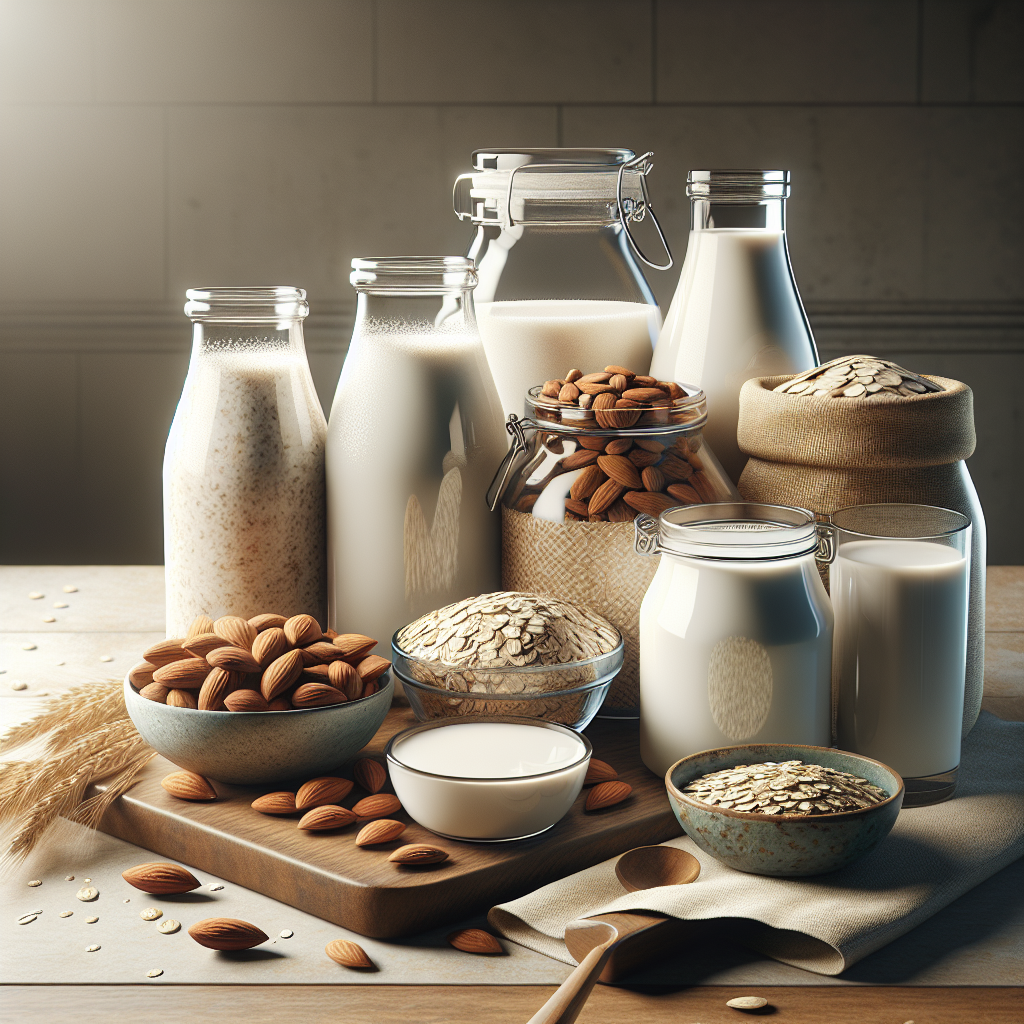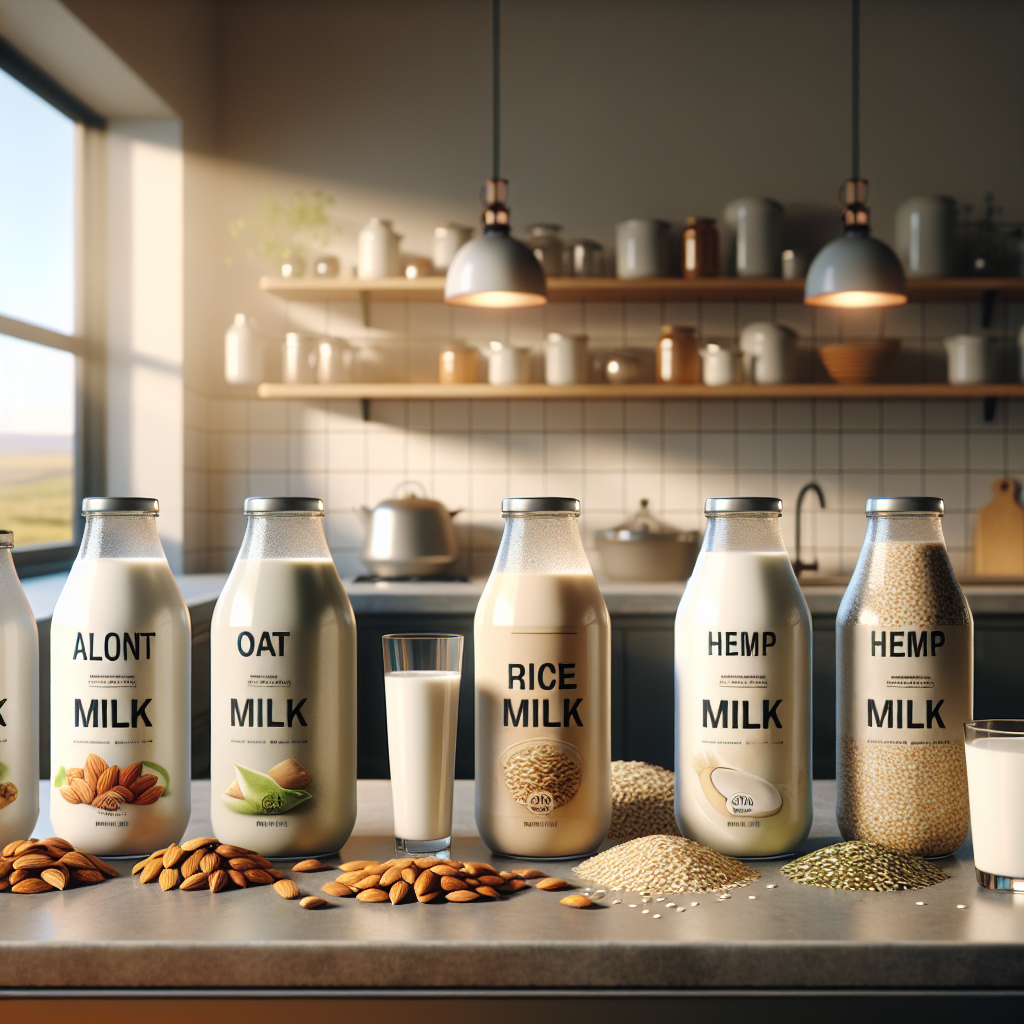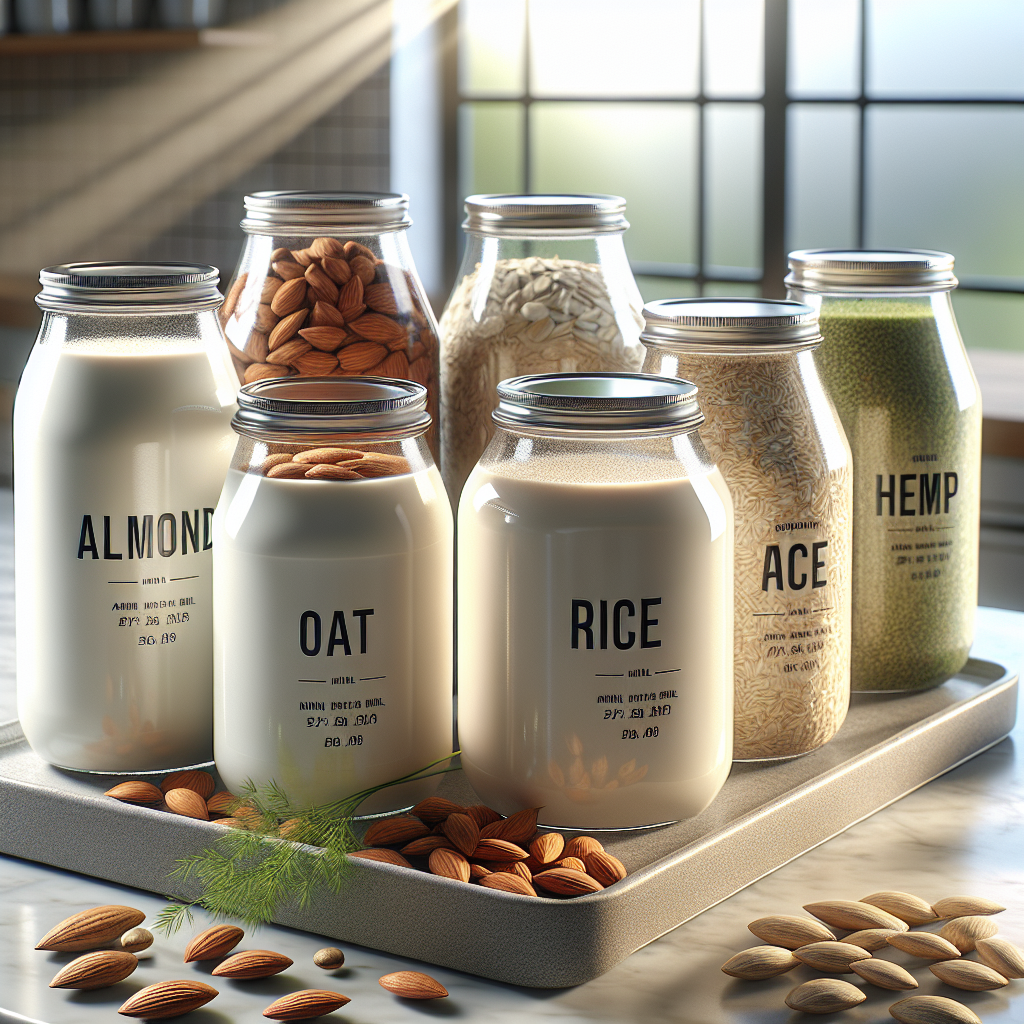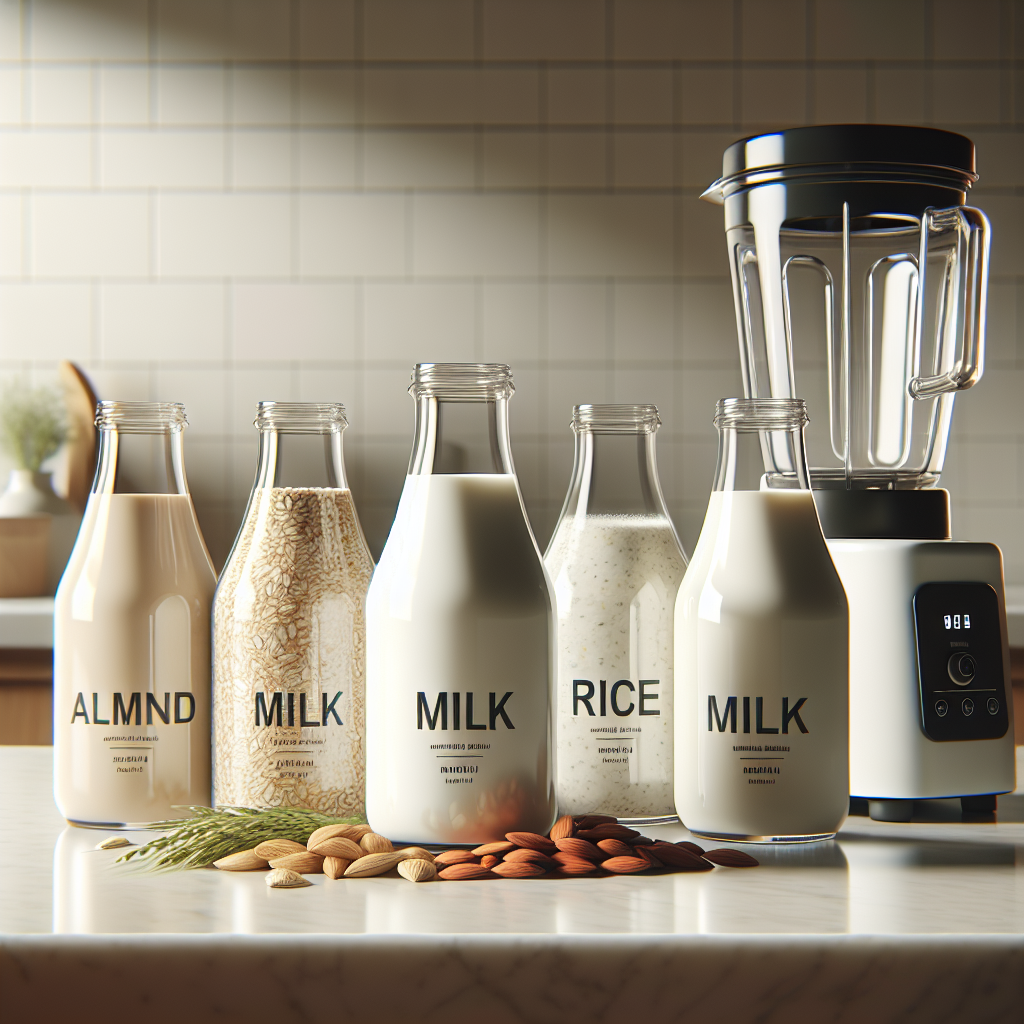In recent years, alternative milk has surged in popularity and for good reason. With an increasing number of people seeking healthier lifestyles and environmentally-friendly options, traditional dairy milk is no longer the only choice. Alternative milk, derived from nuts, grains, and seeds, offers a delicious and nutritious substitute that caters to a wide range of dietary needs and preferences.
From almond and oat to rice and hemp, the options are virtually endless. These milk alternatives are typically lactose-free, additive-free, and preservative-free, making them ideal for those with dietary restrictions or allergies. Moreover, creating your own fresh filtered milk at home is now easier than ever with milkdepot.com's unique blender. In less than 60 seconds, you can transform any nut, grain, or seed into fresh, homemade milk that's tailored to your taste.
Why wait? Start your journey towards a healthier, more sustainable lifestyle today. Get yours today!
Health Benefits of Alternative Milk
The health benefits of alternative milk are numerous and varied, making it a compelling choice for anyone looking to improve their diet. One of the most significant advantages is that alternative milk is often lactose-free, which is beneficial for those who are lactose intolerant. This means you can enjoy a creamy, delicious beverage without the digestive discomfort associated with lactose.
Additionally, many types of alternative milk are lower in calories and fat compared to traditional dairy milk. For instance, almond milk is generally low in calories and contains healthy fats that can aid in weight management and cardiovascular health. Oat milk, on the other hand, is rich in fiber and can help improve digestion and reduce cholesterol levels.
Alternative milk is also a good source of essential vitamins and minerals. For example, soy milk is high in protein and contains all nine essential amino acids, making it a great option for those looking to increase their protein intake. Rice milk is often fortified with calcium and vitamin D, essential nutrients for bone health.
Moreover, these milk alternatives are free from hormones and antibiotics commonly found in cow's milk, reducing your exposure to these substances. By incorporating alternative milk into your diet, you're not just making a choice that's good for your body; you're also opting for a product that's generally more natural and less processed.
Eco-Friendly Benefits of Alternative Milk

One of the most compelling reasons to switch to alternative milk is its eco-friendly benefits. Traditional dairy farming is known to have a significant environmental impact, including high levels of greenhouse gas emissions, extensive water usage, and large amounts of land required for cattle grazing. In contrast, alternative milk production is generally far more sustainable and environmentally friendly.
For instance, almond milk production requires considerably less water compared to cow's milk, and the almond trees themselves help sequester carbon dioxide, contributing to reduced atmospheric CO2 levels. Oat milk is another excellent option, as it requires even less water and land to produce. Moreover, oats are typically grown in cooler climates, reducing the need for extensive irrigation systems.
Another significant advantage is the reduction in greenhouse gas emissions. Studies have shown that producing plant-based milk generates considerably fewer emissions than dairy milk. This is because cows produce methane, a potent greenhouse gas, during digestion. By choosing plant-based alternatives, you're directly contributing to the reduction of methane emissions.
Additionally, the production of alternative milks often involves fewer pesticides and fertilizers, which can contaminate soil and water supplies. Many manufacturers of alternative milks also prioritize sustainable farming practices, such as crop rotation and organic farming, further minimizing the environmental footprint.
By opting for alternative milk, you're making a choice that not only benefits your health but also supports a more sustainable and environmentally friendly food system. It's a small change that can have a significant impact on the planet.
Cost Savings Compared to Store Bought Milk

Switching to alternative milk isn't just a healthier and more eco-friendly choice; it can also offer substantial cost savings compared to store-bought milk. The initial investment in a high-quality milk-making blender, like the one offered by MilkDepot.ca, may seem significant, but the long-term savings are impressive.
Store-bought alternative milks can be quite expensive, often costing between $3 to $5 per liter. These prices add up quickly, especially for families or individuals who consume large amounts of milk. In contrast, making your own alternative milk at home can reduce this cost by up to 90%. By purchasing bulk quantities of nuts, grains, or seeds, and using the MilkDepot blender, you can produce fresh filtered milk for a fraction of the cost.
Consider the cost of almonds, oats, or soybeans when bought in bulk. These raw ingredients are significantly cheaper than pre-packaged milk. For example, a pound of almonds can produce several liters of almond milk, and the same goes for oats and soybeans. By making your own milk, you also avoid the frequent trips to the grocery store, saving on both time and transportation costs.
Another financial advantage is the reduced need for storage space. Store-bought milk often takes up valuable refrigerator space, and its shelf life is limited. Freshly made alternative milk can be prepared in the exact quantities needed, minimizing waste and ensuring you always have fresh milk on hand.
Overall, investing in an alternative milk-making blender is a smart financial decision. The savings on grocery bills, combined with the benefits of fresher, healthier milk, make it an excellent choice for budget-conscious consumers.
Variety of Flavor Options

One of the most exciting aspects of making your own alternative milk is the endless variety of flavor options you can explore. Unlike store-bought milk, which often comes in a limited range of flavors, creating your own milk at home allows you to customize it to suit your taste preferences and dietary needs.
Imagine starting your day with a delicious, homemade vanilla almond milk that perfectly complements your morning coffee or cereal. With a milk-making blender from MilkDepot.ca, you can easily infuse your milk with natural flavors like vanilla, cinnamon, or even cocoa for a rich, chocolatey treat. The possibilities are truly limitless.
For those who enjoy experimenting in the kitchen, you can mix and match different nuts, grains, and seeds to create unique blends. Try combining almonds with cashews for a creamy and nutty flavor, or blend oats with a touch of honey and a pinch of sea salt for a sweet and savory drink. You can also incorporate fruits such as strawberries or bananas for a naturally sweetened option that’s perfect for smoothies.
Furthermore, making your own milk allows you to control the sweetness level and avoid the added sugars and artificial flavors that are often found in store-bought varieties. You can use natural sweeteners like dates, maple syrup, or agave nectar, ensuring that your milk is both delicious and healthy.
Beyond just flavors, you can also experiment with the thickness and texture of your milk. Whether you prefer a thicker, creamier consistency for your lattes or a lighter, more refreshing drink for everyday use, the MilkDepot blender allows you to adjust the ratios and ingredients to get the perfect consistency every time.
In summary, the ability to create a wide range of flavors and textures is one of the key benefits of making your own alternative milk. It not only enhances your culinary experience but also ensures that you’re getting a product that’s tailored to your personal taste and nutritional preferences.
How to Make Alternative Milk at Home

Making alternative milk at home is not only simple but also incredibly rewarding. With the right tools and a few basic ingredients, you can enjoy fresh, homemade milk that's free from preservatives and additives. Here's a step-by-step guide to get you started:
- Choose Your Base: Select the nut, grain, or seed you want to use. Popular options include almonds, cashews, oats, and hemp seeds. Make sure to use high-quality, raw ingredients for the best results.
- Soak Your Ingredients: For nuts and seeds, soak them in water for at least 4-8 hours or overnight. This helps to soften them and makes blending easier. Grains like oats usually don’t require soaking but can benefit from a quick rinse.
- Blend with Water: Add your soaked ingredients to the blender along with fresh water. A good starting ratio is 1 cup of nuts or seeds to 5 cups of water. Adjust ingredient amounts based on your desired thickness.
- Add Flavorings: This is where you can get creative. Add natural sweeteners like dates, honey, or maple syrup. You can also include flavorings such as vanilla extract, cinnamon, or cocoa powder.
- Blend Until Smooth: Blend the mixture on high speed until it’s smooth and creamy. This usually takes less than 60 seconds with the powerful blender from MilkDepot.com
- Strain the Mixture: Use the built-in filtration system of your MilkDepot blender to strain out the pulp, leaving you with smooth, delicious milk. If your not using the Milk Depot Milk Maker then your blender doesn’t have a filtration system, use a nut milk bag or fine mesh strainer.
- Store and Enjoy: Pour your freshly made milk into a glass jar or bottle and store it in the refrigerator. Homemade milk typically lasts 3-5 days, so make sure to shake well before each use.
By following these simple steps, you can enjoy a variety of fresh and healthy alternative milks right from your kitchen. Not only does this save you money, but it also allows you to customize your milk to your exact preferences. Ready to get started on your alternative milk journey? Get yours today!
